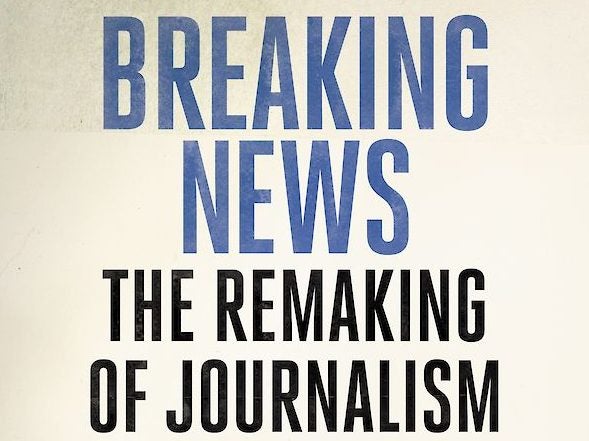
Breaking News: The Remaking Of Journalism And Why It Matters Now, by Alan Rusbridger, is out now published by Canongate. £20.
Alan Rusbridger is a quiet giant of modern British journalism. Like it or loathe it, he and his Guardian set the agenda over the two decades of his editorship.
Phone hacking, Wikileaks, Snowden, The Panama Papers et al, the “Graun” was at the heart of most of the big stories. Now he has written a memoir (of sorts) and a manifesto for the future of journalism. It is a cracking read as you would expect of a great writer.
On the very positive side, he led the Guardian, blinking ,into the digital future until it became the third most read news website in the English language, was garlanded for its exclusives and won a coveted Pultizer Prize in 2014.
British award juries were more churlish. He, like John Birt at the BBC, saw the future and it was digital. Simply, the internet was going to transform journalism and lead to the (near) death of print as a platform. His view, bolstered by the intellectual capital provided by Emily Bell, then of his paper and now at Columbia University, was presciently right long term, less so short term.
It took bravery and it took money. News and digital labs were set up to run alongside and away from the print Guardian. Eventually they became totally integrated in the newsroom and Rusbridger adopted a policy of “digital/web first” for all news. Free, with no pay wall. And there lies the rub.
It led to the Guardian bleeding money as the anticipated new flow of digital advertising revenue did not arrive in time to make up for lost income from print. Indeed digital has only just exceeded print revenue in 2018.
From the small acorn of Guardian Unlimited, the “paper” has expanded to the huge digital treasure trove is it is today – full of content, full of innovation and multinational with Australian and American editions making it truly 24/7.
It is hard to remember a time before the Guardian online. Also, hard to remember the last time I bought a print copy. Circulation of that is down to less than 140,000 in July 2018. Digital is now 25m in the UK alone.
On the not so positive side, the digital path ate up the reserves of the Scott Trust. The £600m legacy of owning and selling Auto Trader was depleting year by year. Fleet Street sages, already up in arms over the Guardian’s exposé of their dirty phone hacking laundry and the Leveson Inquiry, were getting ready to jump on the paper’s grave.
Rusbridger, who displays a surprising commercial savviness in this book, ignored the premature obituaries and continued to innovate and to spend. He left on a high in 2015 after winning the Pultizer Prize for the Snowden files. Now he is the head of house at Lady Margaret Hall, Oxford University, still innovating, still disrupting the status quo.
Post hoc there has been somewhat of a thrashing of his reputation at the paper and wider. He lost the chairmanship of the Scott Trust after a battle and a period of deadlock. Now he is just a contributor from down the M40. That is a pity. His lasting achievement is there in cyberspace for all to see.
The paper has survived on all platforms, thrived on some.
Rusbridger also offers lessons for all journalism on how to adapt and not die. British newspapers have been woeful in their embrace of the web. Too little, too late.
The audience and the advertisers have long drifted from them to there. Only niche publications like the FT and the Economist have truly survived the digital tsunami. Facebook and Google are the new masters of the advertising universe. They have eaten the lunches of the legacy media tout court.
America has fared little better, with only the New York Times and the Washington Post truly holding their heads above the digital tide – one by a clever paywall, the other thanks to a very wealthy sugar daddy. Most have drowned. In July 2018, the New York Daily News announced the retrenchment of half of its journalists, the latest chapter in the not-so-slow death of US city journalism.
So, what is there to learn from Rusbridger’s Guardian?
Good journalism always shines through, but needs imagination, willpower and money. It also needs to be realistic. Some Rusbridger’s innovations, like “open journalism”, were perhaps an idea too far – you also need to find a way to pay for it. Rusbridger never solved that conundrum and his successors are rowing back in scale, range and ambition, begging from readers and cutting jobs.
But none of that takes away from his greatness as an editor. Buy this book, read it on any platform you can find. It is an important text.
John Mair is the editor of twenty five books on journalism. The latest, Anti-social Media, will be published in the autumn by Abramis.
Email pged@pressgazette.co.uk to point out mistakes, provide story tips or send in a letter for publication on our "Letters Page" blog
